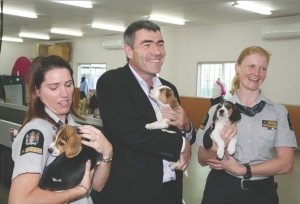To make it crystal clear: funding has not been cut for biosecurity.
Appropriations for ‘border biosecurity monitoring and clearance’ were temporarily higher in last year’s Budget because $5 million in funding was brought forward from 2011-12 to pay for the Joint Border Management System (JBMS), and $1 million for the merger to create the Ministry for Primary Industries was also brought forward.
It is normal practice for costs for major projects to be variable across different financial years, and shows why it is misleading to just look at the headline figures.
If Mr Proudfoot had checked with me I could have explained this to him.
Biosecurity is my number one priority as Minister, and overall funding has doubled since 2000. We now have a major programme of work underway to improve what is already a world-class system.
Over the last six months we have recruited 56 new frontline biosecurity, 12 of whom graduated in Christchurch last month. A further 30 are being recruited shortly.
We’re also working closely with Australia on our preparedness for foot and mouth disease. A recent Auditor-General report noted that MPI has been successful in responding to incursions, and plans are being updated to deal with pests, improve our surveillance and targeting, and hold ongoing regular exercises and simulations.
I also take issue with the claim that the Budget contains little for the primary sector.
As well as the $80 million for irrigation, funding is also continuing for the Primary Growth Partnership (PGP). This is a government-industry initiative that invests in major programmes of research and innovation.
In just three years, the Government and industry have invested $650 million into these projects. This covers everything from aquaculture, biosecurity, forestry, red meat projects and many more. In total these have the potential to add over $7 billion to the wider economy.
We also have the Sustainable Farming Fund which is investing $8.8 million into 42 projects. Some of these projects include improving nutrient management, promoting pasture persistence, biological controls for pests, and developing aquaculture.
Other programmes across Government will also have a real impact on the primary industries.
The National Science Challenge has identified 10 top priorities, and four of them have strong relevance to the primary sector: Our Land and Water, High Value Nutrition, Resilience to Nature’s Challenges, and Science for Technological Innovation.
Over $70 million is being invested into tackling these issues over the next four years.
Our reform of the RMA will continue to streamline the process and continue to manage environmental obligations. Change to transport rules for agricultural vehicles have also been well received
by farmers and contractors.
The Rural Broadband initiative will deliver high speed internet to 252,000 rural households, connecting us locally and internationally.
We also have the biggest investment in New Zealand’s roading network in history, with $11 billion over 10 years going towards seven major highway projects. This will get product from the farm gate to the processor and onto markets even quicker.
At the same time, we have carefully managed Government spending so that we are back into surplus next year. This is a huge achievement and most other countries around the world will be envious.
Importantly, this good financial management means that interest rates are at a 50 year low – more good news for the primary sector.
There is a huge amount happening in the primary industries and I’m proud of how the Government is backing our economic powerhouse.
• Nathan Guy is the Minister of Primary Industries















